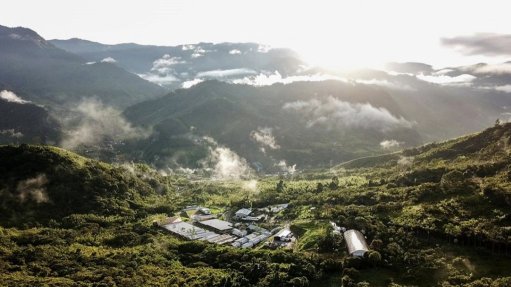Freeze-drying could boost food sustainability and security
Food freeze-drying technology has the potential to help create sustainable food practices, increase food security and cut food waste (caused by decay), even in rural areas of Africa, says US scientist and astronaut Dr Sian Proctor.
“Thinking about sustainable food practices really means thinking about how we go from the farm to the table, and how we can be more efficient when it comes to the distribution of food,” she tells Engineering News & Mining Weekly exclusively. “I’m thinking mostly of how we can use space technology to help in food distribution, and particularly freeze-drying food.”
Freeze-drying is a different technology to dehydration. Both approaches remove the water from the food, but freeze-drying keeps the volume of the food (freeze-dried blueberries, for example, still look like blueberries, without becoming shrivelled) and freeze-dried foods are easier to rehydrate.
When fresh or frozen foods are transported, you transport the water (or ice) they contain as well as their nutrients. With freeze-drying, you transport only the nutrients. To eat freeze-dried foods, you just add water (and heat, if it’s available, but heat is not essential) and stir. The food still looks like food. Fruit, vegetables and meat can all be freeze-dried. The world’s first freeze-dried product was and is instant coffee.
However, she stresses that freeze-drying is not meant to replace fresh food. Her aim is to use the technology to replace frozen food.
“Freezing food requires the existence of a complete cold chain, from the freezing plant, along the distribution and storage networks, and in the home, right up to the point when the food is cooked,” she highlights. “Freeze-drying would massively reduce the volume and weight needing to be transported and would eliminate the entire cold chain. And freeze-dried food has a long shelf life.”
In South Africa, freeze-dried foods are most familiar to the hiking, climbing and adventure camping communities. But in the US, freeze-dried fruit is now available in almost every grocery.
Also in the US, a single freeze-drier unit costs about $2 000, she reports. But such units are small.
This is one of the main issues that need addressing, to allow the technology to be rolled out across Africa: upscaling the freeze- drying plants to allow for industrial production. Freeze-drying is also a complicated process, and, in South Africa, except for instant coffee, freeze-dried foods are very expensive. But, Proctor points out, they are becoming cheaper, and that she and her collaborators are looking at ways to make the freeze-drying process more efficient.
Another major issue is the opposite of upscaling: it’s getting the technology into rural villages.
“We’re looking at developing solar plus battery-powered mobile freeze-drier units that can be taken to local communities, to freeze-dry a portion of their produce,” she reports. “That would allow them to keep some, stored, to ensure food security in the event of a crisis, and to access longer-distance markets.”
And then, there is the simple issue of unfamiliarity with the concept. “But it’s just a matter of people getting used to it,” she observes.
People can live on freeze-dried foods. Astronauts have used such foods, for decades. Deep space crewed missions will have to rely on such foods. In fact, Proctor has actually published a “Meals for Mars” cookbook, which focuses on freeze-dried foods.
Article Enquiry
Email Article
Save Article
Feedback
To advertise email advertising@creamermedia.co.za or click here
Press Office
Announcements
What's On
Subscribe to improve your user experience...
Option 1 (equivalent of R125 a month):
Receive a weekly copy of Creamer Media's Engineering News & Mining Weekly magazine
(print copy for those in South Africa and e-magazine for those outside of South Africa)
Receive daily email newsletters
Access to full search results
Access archive of magazine back copies
Access to Projects in Progress
Access to ONE Research Report of your choice in PDF format
Option 2 (equivalent of R375 a month):
All benefits from Option 1
PLUS
Access to Creamer Media's Research Channel Africa for ALL Research Reports, in PDF format, on various industrial and mining sectors
including Electricity; Water; Energy Transition; Hydrogen; Roads, Rail and Ports; Coal; Gold; Platinum; Battery Metals; etc.
Already a subscriber?
Forgotten your password?
Receive weekly copy of Creamer Media's Engineering News & Mining Weekly magazine (print copy for those in South Africa and e-magazine for those outside of South Africa)
➕
Recieve daily email newsletters
➕
Access to full search results
➕
Access archive of magazine back copies
➕
Access to Projects in Progress
➕
Access to ONE Research Report of your choice in PDF format
RESEARCH CHANNEL AFRICA
R4500 (equivalent of R375 a month)
SUBSCRIBEAll benefits from Option 1
➕
Access to Creamer Media's Research Channel Africa for ALL Research Reports on various industrial and mining sectors, in PDF format, including on:
Electricity
➕
Water
➕
Energy Transition
➕
Hydrogen
➕
Roads, Rail and Ports
➕
Coal
➕
Gold
➕
Platinum
➕
Battery Metals
➕
etc.
Receive all benefits from Option 1 or Option 2 delivered to numerous people at your company
➕
Multiple User names and Passwords for simultaneous log-ins
➕
Intranet integration access to all in your organisation





















